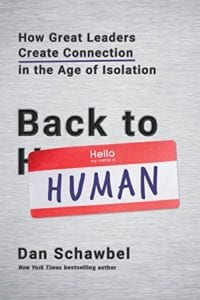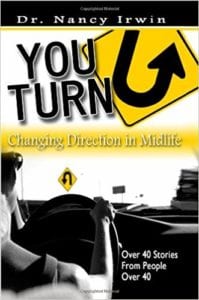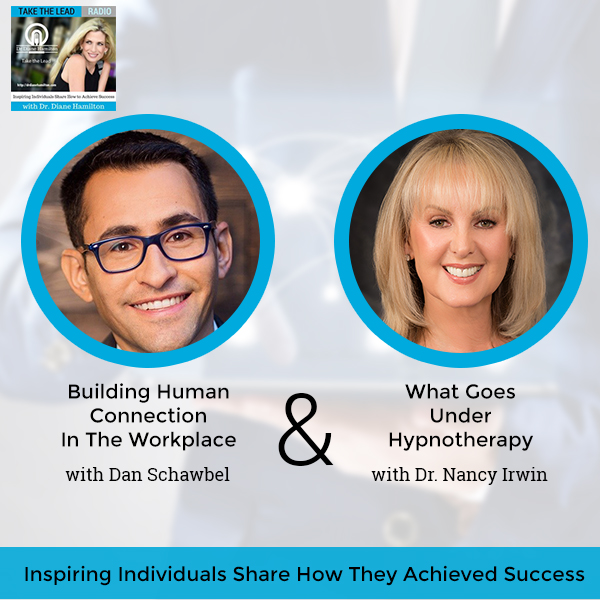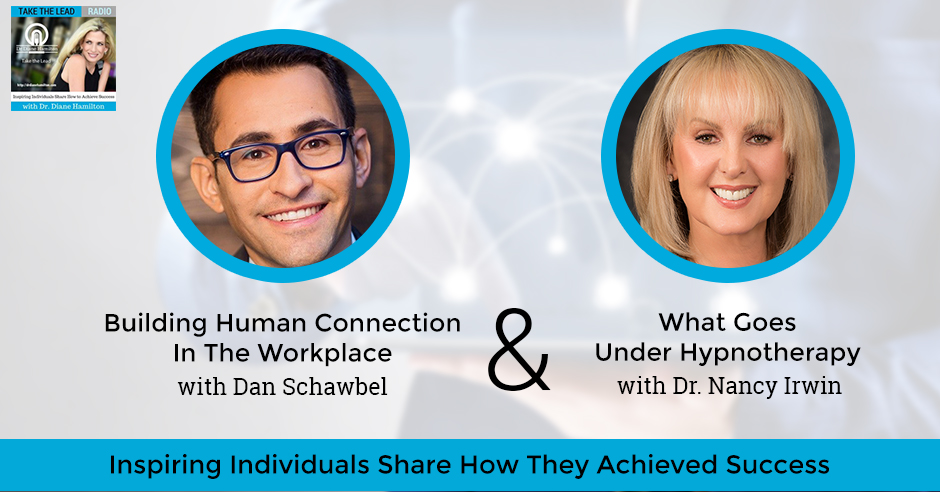I’m so glad you joined us because we have Dan Schawbel and Dr. Nancy Irwin here. You’ve probably seen Dan everywhere. He’s a New York Times bestselling author. He’s a Forbes 30 Under 30 and a Fortune 500 consultant. He is a Millennial expert and has a new book. Dr. Nancy Irwin is a bestselling author as well. She’s a psychologist at Seasons in Malibu and she’s a former stand-up comedian who also is a hypnotherapist.
Listen to the podcast here
Building Human Connection In The Workplace with Dan Schawbel

Back to Human: How Great Leaders Create Connection in the Age of Isolation
I am here with Dan Schawbel, who’s a New York Times bestselling author, Partner and Research Director at Future Workplace and Founder of both Millennial Branding and WorkplaceTrends.com. He is the bestselling author of Promote Yourself, Me 2.0, and his third book, Back to Human: How Great Leaders Create Connection in the Age of Isolation. He has interviewed just about everybody I could think of. I was looking at your list and it’s amazing. We’ve got Warren Buffett, Anthony Bourdain, Jessica Alba and the list goes on and on. It’s so nice to have you here, Dan.
I’m happy to be here. Thanks for having me.
Your background is fascinating. I was looking at what you’ve done, for the amount of work you’ve done, and how you’re the go-to guy for all things Millennial, younger generation-related. How did you get to be the expert in that area?
I am a Millennial born in 1983. My birthday is September 14th, which is pretty wild. I’ve been working since I was thirteen and my first internship was in high school. I had seven more internships in college. I started my own small business serving other small businesses, developing websites when I was a sophomore in college. I had seven leadership positions on campus at Bentley. Back then it was Bentley College now Bentley University in Waltham, Massachusetts. I spent three and a half years at EMC Corporation, which is now EMC Dell. During that time, I went from product marketing to online marketing. Then I created the first ever social media position in 2007 early on. I created that position because in 2006, 2007, I was early into blogging. I started a blog that had no subscribers, no readers, no views, no comments, nothing and I built that.
I went from zero to a million on my own without any investment. My parents never gave any money, anything. I worked hard at it. It was a whole blog list a week. I commented on every blog that mentioned personal branding because that was my topic back then, it was how do you market yourself using all these new social media tools to build a brand and be found? I had such conviction and I had such vision that this would all come to fruition and eventually, it did. I wanted to follow my generation throughout their whole career path, students, CEO. If anyone else benefits from that, so be it. Each book and everything I’ve done has been a little bit broader, so it affects more people and more people can relate to this research, work, quotes, and experiences that I’ve had.
It’s been an enormous ride. Even to get my first job out of school with a near flawless resume. It took eight months meeting fifteen people for three positions to get a job. That doesn’t include my interviews with other companies, like Dunkin brands and several others that I can’t even remember. Even an internship at Reebok, it took me a year and a half because they were only giving internships to the sons and daughters of executives. I fought through that to get into the school in general. I didn’t get an early decision and that forced me to get straight A’s in my last semester of high school with the internship, interviewing on campus, and writing admissions a letter. It’s always been this story through my whole life of not getting something, and then working extremely hard to overcome and be persistent and eventually, get what I was looking for.
Even with my books, every book was rejected by every single publisher besides one. I barely got each book a deal, yet each book is more successful than the last. With the blog, I had no investment. I built that from nothing. It’s always been a struggle, but the struggle has taught me so much about myself in that nothing’s going to come easy and each failure grounds me. It’s like a reset so that I don’t get ahead of myself and develop a big ego. It took me over six years to interview people like Trump, Tony Robbins, and other pretty big names. I only got Warren Buffett after my 1,900th interview. I’m patient with persistence.
[bctt tweet=”Failing or someone rejecting you is an instance, not a lifetime.” username=””]I go right at it. I am extremely aggressive, but if it doesn’t happen I accept it. I’m willing to wait twenty years to make something happen because I’m doing this forever. Eventually, I’ve done 2,000 plus interviews. That will be 7,000 in X amount of years. Everything I’ve done in my research studies has been for free in the beginning. In my speaking career, I spoke for free for the first 30 times at schools in the Boston area. Now, I’m up to over 170 speeches. I’ve grown that from nothing to something. I’ve now done 45 research studies where I’ve interviewed over 90,000 people in twenty countries. I’ve raised all the funding.
By next year, I’ll hit over a million dollars in funding I personally raised. In the first few studies, I didn’t make any money off them. I did an enormous amount of work to get those out there and published. I still love the research. I’ve have had multiple companies and my company was acquired. It’s been this journey that I’ve never set out to do any of this. I’ve had a vision over time, but everything organically builds into the next thing. I’ve never been like, “I want to do this.” It’s always like I’m doing something and then the idea comes from the act of doing.
It’s interesting that you and I have a lot that we like in common. I love research and I’m interested in the same topics that you’re interested in. I was watching some of your interviews that you mentioned. You’ve had Schwarzenegger and Sandberg and they go on and on. I’ve watched the Sir Richard Branson interview. I love that he started out by saying, “Learning is a reason for his success,” to some extent. It sounds like it’s been a big reason for your success as well. You continued to learn and push yourself. It’s interesting to look at some of the things that you’re doing compared to some of the things I’ve been working on because you talk about failure that is grounding you. In my research on curiosity, I found that fear of failure and fear of a lot of things are one of the things that hold people back. Why do you think it doesn’t hold you back and it holds other people back?
It’s because of the sheer amount of failure I’ve been through. I fail every day. It depends on how you define failure. I don’t even define it in a way that other people would. Failing or someone rejecting you is an instance, not a lifetime. It’s happening now, but it doesn’t mean they’re going to say no for the next 50 years. No means not right now. Come back with a more interesting valuable proposition in the future. If you have five subscribers to your blog and you’re pitching to try and interview someone famous, you’re probably not going to right now, you’ll get rejected. If you come back in five years and you have a bigger platform, then you have a better shot. I’ve learned this early on by working as a teenager. I’m more accepting of failure, rejection and mistakes now because it’s been part of the process. It’s less of a surprise and it’s more expected.
Chapter three of my book, Back to Human, is about practicing shared learning. That’s become one of the chapters that people keep pointing out because I believe that you can no longer learn in isolation and that true power and influence in our society is not hugging onto information but sharing it. We’ve learned this on social media, the more you share, the more you’re able to build a following. Whether you have a podcast, a radio show or a blog, whatever you have, giving away the best stuff for free is how you gain influence, power or following and are able to sell books, build your business, and anything else you’re looking to achieve in life. In the workplace, the more you share, the more you’re able to connect with the people you’re working with in a human way and benefit them.

Human Connection: The biggest thing that gets in the way of human connection to the workplace is email.
By creating that culture of learning and sharing, people are more willing to help you out when you need it and that’s how the team can progress. We can’t learn in isolation. We get better when we learn together. The average relevancy of a learned skill is only five years. In order to keep up with the changing demands of the economy, we do have to rely on each other. If somebody in your team finds a research, for instance, that would benefit you, they should share. If you’re trying to learn to scale and your teammate is an expert at that scale, then they should try and help you. It seems very basic, but it doesn’t happen as much. What’s happening in the workplace there are people who are isolated. Everyone has lunch alone at their cubicle instead of going out to the cafeteria with their teammates.
People are working remote. In the Virgin Pulse study that I work on with them, we found that of over 2,000 managers and employees, a third of the employees were promoted and two-thirds of them were disengaged from their job. Everyone talks about the positive side of working remote, of how you get freedom and flexibility and how it lowers your commuting costs. No one talks about the negative side, which is isolation because you’re having less human contact, which creates loneliness, which is unhealthy. In America, almost half of the Americans are lonely. In the UK, nine million people are lonely and over 200,000 adults haven’t spoken to a close friend or a relative in the past month. In Japan, 40,000 people die of loneliness every year. This is a huge issue and it’s costing billions of dollars across different countries.
A lot of this has to do with the technology that we’re using. We’re spending so much time on technology and it’s isolating us. It’s created the illusion that we’re so connected, that we have so many friends, and that we’re being collaborative in the workplace. Yet these relationships have been weaker because true relationships are built through human connection. People should use technology as a bridge to human connection, not a barrier. Technology is good if it leads you into a physical place or a phone call where you’re talking with someone and establishing a stronger connection. It’s not good if, let’s say, you use technology to bring a group of your team into a conference room, and then you’re still on your phone instead of being present with the people you work with so that you can collaborate, exchange ideas, and get to know each other better. Only 20% of companies have social events for their teams. Company outings, for instance, in the study we found that that’s the number one way to create more human connections between team members.
[bctt tweet=”No means not right now.” username=””]That’s interesting because I’ve worked in a virtual way more. I was a pharmaceutical rep forever. You’re working out of your home in that respect even though you’re out and you’re connecting physically in person with people but not your coworkers. I’ve worked as an online professor for eleven, twelve years, and so I’ve always been in a virtual setting. I took your self-assessment on your site.
What score did you get?
It was bad because I’m not around people. I’m not the typical person. I didn’t know how to answer a few of them because my job doesn’t fit into the normal of how people work kind of setting.
You can go to WorkConnectivityIndex.com if you want to take it as well. It’s free. It gives you a general awareness of how connected you are. Hopefully, you read the book or you have a general awareness that you should get more human contact because it’s better for you to be happier as a result.
With my job, I’ll interview maybe ten people in a week, but it’s not face-to-face. Some of it is face-to-face. Sometimes I’m on two or three other people’s shows that sometimes they’re face-to-face. I can interact with 30 to 50 people sometimes in a week, but mostly it’s a virtual thing. The virtual work is interesting to me of how you pull people in. In my last job, I was an MBA Program Chair at the Forbes School of Business and in that job, a lot of times we did Zoom meetings and things like that. How effective is that with connecting people to work when they’re virtually into those kinds of conferences rather than the audio conference calls? Is that helpful?
That’s helpful because you see body language. You see emotion and energy, and you don’t get that with just a phone call or certainly not a text. What we found is the biggest culprit, the biggest thing that gets in the way of human connection to the workplace is email. Yet one face-to-face conversation is more successful than 34 emails exchanged back and forth because it’s a lack of understanding. If I keep emailing you, the reason I keep emailing you is I am not communicating effectively. Not one of us or both of us are understanding what we’re saying or any clarification. All you have to do is pick up a phone through a video conference, walk over one foot to their office and talk to them. It’s so critical to have that face time because there’s no way that having face time could be bad for your career. If you’re not seen and heard, you’re not going to get promoted. You’re going to make less money in your career. While remote work is great, there are limited career prospects as a result, as a trade-off.
It’s interesting to look at how everything’s changed just in general for me in the workplace, the way teams are set up. I entered the workplace in the ’70s and it was madmen. It was different. Everything’s a little more team-based now and they’re flatter. You don’t have one person that wants to be the head of it as much as you used to be. Do you think Millennials are viewing everything different? We talked about how you view failure and I’m wondering if you think Millennials view failure differently in general. Are they viewing teamwork different everywhere? How is their perception different than what we saw in the past?
It’s hard to say for the whole age group and speak for the whole age group because people are different. One of the things is we don’t think we’re going to have to retire and many of us don’t have that. I’d never want to retire. I come from a family where my dad is still working at 75. It’s a little biased there clearly. We expect more from our employers now than previous generations did. We want meaningful work. We want to make an impact. It’s a good timing to have that interest and passion because artificial intelligence is coming into the workplace. It’s going to eliminate a lot of tasks that we don’t want to do, which could hopefully free up time, so we can focus on more impactful tasks that align to our interests, strengths, passions, and enable us to make an impact through our job, which is what we’re looking for.
The other thing is to pay fairness. Everyone talks about getting paid more. It’s about fair pay is what we’ve discovered. You can figure out if you’re getting paid fairly very easy. Millennials are more open to talking about how much they make, and we have access to so much information at our fingertips. We can go to Payscale or Salary.com and figure out what someone at our level is making on an average. Paying people fair is important. After that, flexibility is the most important thing by far.

Human Connection: We need to treat people with respect and empathize with them.
After flexibility, it’s healthcare coverage and then learning and development opportunities. When you’re younger, learning and development are more important. You just want to learn so much. There’s so much you don’t know, so you have a natural curiosity. Healthcare benefits are important because this cost is high. If the cost wasn’t high, they probably wouldn’t think about it as much because it’s more for older workers who have to worry about that, who are more likely to get sick.
Flexibility is important to us now because there are a million new Millennial moms per year. We need flexibility. There’s so much demand for it. That’s why you’re seeing Netflix as unlimited maternal-paternal leave, which is a big deal. It’s one of the biggest employees’ benefits I’ve seen in a long time. Other companies are following smoothly. My friend at GE has paternal leave and his wife works at BJ. She’s getting several months off. That’s how it should be. We should start to care and invest in employees.
Make them feel safe, comfortable and supported in the workplace because people want to bring their full self to work. If they’re in a bad mood outside of work, it’s not like that mood is going to stop when they entered the office. If they had a bad work day, it’s not like they’re going to come home and be happy and not complain about work. Due to technology, of how connected we are, and the demands of the workplace, everyone’s connected all the time. We have to embrace people’s humanity in the workplace because it’s coming, whether we like it or not.
You made a lot of great points there. I want to go back to what you said about making an impact with AI and all the different aspects that are changing in the workplace. You brought up curiosity in your conversation. You brought it up in your book when you were talking about you wanting to hire people who have a natural sense of curiosity. One study found that 57% of companies are looking for candidates with intellectual curiosity. Now that AI is going to have such a big focus on innovation, everybody wants to be more innovative. We want more curious people. How do you help people to determine if somebody is a curious candidate? I know if you asked them, “Did you visit our website?” and that type of thing, but do you have any other suggested ways to determine?
Curiosity, to me, is about the willingness to learn and experience new things. It is how you develop. Even if you travel to a country you’ve never been to before, naturally, out of that environment you’re going to learn something about yourself, the people around you and the world at large, maybe even how they do business there. That’s incredibly valuable. On the job, if you’re getting into the habit of learning and sharing and meeting people in other departments to figure out what they’re doing every day, that’s invaluable. You’re learning how a corporation works. It’s almost like you have to create your own MBA if you’re not going to get an MBA. Firsthand experience is more valuable than anything you learn in college. That’s why I always had internships along with having classes. Anything I learned in class, I could apply for the internship.
[bctt tweet=”True relationships are built through human connection.” username=””]Anything I learned in the internship, I could make more sense of while I read a textbook or take a test. Curiosity is important because in finding out if someone’s curious it’s like, how are you learning about a new information. When was the last time you took a course? What was the last book you read? Simple questions like that give you a sense of, “Is this person investing time in themselves? Are they investing in themselves and their learning development?” While companies, especially larger ones invest in your learning development, it’s on you to take advantage of that learning development.
If someone’s not willing to do that, if someone’s not willing to invest in themselves, then why should you invest in them? If I didn’t invest in myself, why would a client invest in me? Why would a publisher want to invest in me? Why would anyone want to invest in me? You need to become your own success story. You need to become your own evangelist. You need to become your own self-learner before you’re able to provide more value to others and expect others to want to care and invest in you. It’s how it works.
You had interviewed Warren Buffett and I saw a video of Warren Buffett and Bill Gates. The thing that they said that made them connect with each other and they had in common was their sense of curiosity. We’re going to hear a lot more of that as a buzz term because innovation is such a focus. You wrote about empathy, which is a big part of emotional intelligence, which is what I wrote my dissertation about.
It’s the hardest, yet most important chapter I wrote.
Why was that for you?
It was hard because it’s one of those topics that people don’t understand well. You have to search deep within yourself to figure out what empathy means to you and how you can become more empathetic as a leader. Then my publisher was like, “I want you to write a part of the chapter on the #MeToo Movement.” I was like, “This is going to be a big challenge.” As a male author, I interviewed 100 young leaders who are 100 of the top companies. I took a few women and men whom I interviewed and I asked them more questions in the #MeToo Movement. What it came down to is less about gender and more about abuse of power.
Then I threw a bunch of statistics about sexual harassment globally. What it comes down to is we need to treat people with respect, empathize with them. We’re all adults here. We’re all trying to have an impact, live a good life and from a business perspective, make the company grow. When you take a step back, realize that, support other people and meet people where they already are, everyone’s bringing their selves into the workplace. We don’t know what people are going through on a daily basis. You could walk into the office and someone could scream at you, but you don’t know that their mom died four hours before. They’re projecting on you the pain they’re experiencing. You’ve got to take a step back and be okay with it. It’s almost like a scale you have to develop to be able to handle that because it’s so easy to snap at them. It’s so easy to never want to talk to them again, but that’s not effective. You might be that way too someday. You want them and you want others to be empathetic so you have to be empathetic to others at the same time.
I can remember, as a pharmaceutical rep, I was going to shake a doctor’s hand and he said, “Don’t touch me.” He had a cold and that was all it was. You put your own thoughts into what could be behind things and I found it interesting to study emotional intelligence for my dissertation. Empathy is one of the biggest factors and I could see how that would be one of the harder chapters to write.
Around that time when I was writing it, I experienced some few issues that happened to me, a few situations where there was a lack of empathy and it hit home. For instance, I was running in Santa Monica, LA and I was about to fall right on my face because of the sand. I was tripping and no one even budged. It was like 70 people around me and no one even cared. Then in New York, I was scammed $400 walking in the Grand Central area midtown. I called my parents and other people and everyone was making fun of me instead of being empathetic to what I was experiencing. It’s certainly lacking in this culture. These people are so desensitized. There’s so much hate. I don’t even watch the news anymore. It puts you in a bad mood.
It’s like reading the comments and social media, all the haters. It brings you down. That’s got to be hard for anybody that’s a public person. You’re going to get the people who are going to write something nasty, who will write whatever comments. You could do everything perfectly and they’re still going to say something. That’s a tough thing for being in public.
What they’re doing is projecting pain. What it comes down to is they dislike or hate or are unsatisfied with an aspect of their life and they’re projecting that on you instead of trying to solve it internally, which is the issue.
Your book could be helpful for so many people to look at some of those aspects. There are so many things that you wrote about in this book because you want to help people be good connectors, team players, and help build the organization. There are so many aspects. I hope everybody gets a chance to check it out. I was wondering if you wouldn’t mind sharing the website.
You can get the book on Amazon, BackToHumanbook.com, Barnes & Noble or local bookstores. I have a new podcast called 5 Questions with Dan Schawbel where I ask successful people five questions in under ten minutes. It’s the podcast people listen to in between meetings.
Is it always the same five questions?
It’s not but I’m very consistent with my last question. I have been through my whole career like it used to be, “What are your top three pieces of career advice?” That ends up becoming three questions for the podcast. It’s so short. Now it’s like, “What’s your best piece of career advice?”
I used to do the same question at the end because I thought I would end up writing a book and then I would have all these great things to put together for a book. Now, I became interested in writing a different book and so I asked different questions. It’s fun to have the same focus though to get everybody’s input. I’m interested in your work. You are such a nice guy to do my show because I know you’re everywhere and I am honored to have you on the show. Thanks, Dan.
Thank you very much.
You’re welcome.
What Goes Under Hypnotherapy with Dr. Nancy Irwin

You-Turn: Changing Direction in Midlife
I am here with Dr. Nancy Irwin, who is a licensed clinical psychologist and a highly sought-after addiction therapist who specializes in EMDR, in hypnotherapy, as well as other holistic approaches to treating addictive behaviors, sexual abuse, recovery, and other traumas. She’s also the author of You-Turn: Changing Direction in Midlife. She has created a collection of over 40 stories of people over 40 and you’ve probably seen her on CNN, CNBC and Fox. She’s everywhere. It’s so nice to have you here, Dr. Nancy.
It’s a pleasure, Dr. Diane. Thank you so much.
I’m interested in your career change. You used to be a stand-up comic.
It gets even worse. Before that, I was a trained opera singer. That’s how I changed to stand-up comic. Sadly, I wasn’t good enough for big-time opera and people started laughing, so I changed. Here’s the cool thing when you talk about reinvention, I was able to see that there were transferable skills. I had a flair for comedy. I had good stage presence, etc. so it was fairly easy to segue into comedy from that.
I did an improv in town, which was so much fun. I’d never done that before. What drew you to comedy? What kind of comedy are you into? Are you a Seinfeld lover, Romano lover or what? What makes you laugh?
It’s so funny you mentioned both of those. I grew up in the clubs in New York with those. I opened for them countless times. They’re both wonderful. We always knew Ray Romano would make it. I knew him way before he was who he is and he’s the nicest guy in the world. I did understand that I had a flair for comedy. I loved being on stage. I had a good sense of humor, of movement and all of that. Some friends of mine said, “You’d be good as a solo stand-up act,” because they’ve seen you do comedy plays and things. I was like, “I could see me doing that.” I started scoping out the scene and thought, “Here’s what I’m going to do.” I had a couple of cocktails one night and went to an open mic night thinking, “I’ve got to be better than some of these guys up here.
Fortunately or unfortunately, it went very well. I got the bug, I killed and all. I had many nights bombed after that, but I loved the lifestyle. The comedy was huge. It was right when Seinfeld, Ray Romano, and all those guys were breaking as well as young Dave Chappelle. It was crazy. It was fun and I got to travel all over the United States and a couple of foreign countries. I had a modicum of success. Then I came out to Los Angeles because I heard Hollywood was needing more blondes. I was working the clubs here. When you’re a comic, you only work about 30 minutes a day. I was bored and had a lot of time on my hands, so I started volunteering for a shelter in my community for sexually abused teenagers. I absolutely fell in love with it. It underscored me.
[bctt tweet=”Curiosity is about the willingness to learn and experience new things.” username=””]I would do the clubs at night and then the kids by day. Here were these incredible, mostly female who had been working as prostitutes on the street many times to support their mother’s drug habits. At their tender age, they chose to get off the street and enter this shelter. It got me right in my heart. I’ll never forget this one little girl, but she was leading me around the shelter and sharing her story. I remember those enormous brown eyes of hers and she had lived on the street with her mother. Her job was to service men to get money for her mother’s drug habit.
If she didn’t bring back X amount of dollars, her mother would bring a cigarette and burn it out under her arms and legs. She was eleven years old covered with cigarette burns, but still had this light in those big eyes and that was something that opened up. That was absolutely an epiphany. Looking at those huge eyes and seeing her soul and how she was brave enough to know there was more to life. She wasn’t blocked by hatred and bitterness. I was like, “There’s something more for me to do.” It woke up the healer in me.
I can’t even imagine that this goes on. That must have broken your heart to see all that.
It did break it, but it also opened it because I was able to see. There was something more for me to do besides telling jokes to drunk people at midnight in the clubs.
Di you go back to school at that point?
I did. It took me a few months. There was a tipping point one night at the club when the manager yelled at me over something stupid and I was like, “I’ll work with these kids who were pregnant by their pimps. They’ve been strung out, they’re suicidal. I don’t need to do this anymore. There’s something else for me.” The field of trauma called me, so I started researching schools. It took me a few months to do all that. Then I gracefully exited from comedy and it didn’t hurt at all. I was so ready for that move.
You know it when it’s time to go to the next thing. I’m fascinated by your next thing because this hypnotherapy is fascinating to me. What led to your interest in going in that direction?
Having seen so many hypnotists in the comedy clubs, I thought it was a silly parlor trick. When you’re working on your doctorate in psychology, you do cover hypnosis. I was rolling my eyes and I was learning that this can be an excellent form of brief therapy for many issues. Not everything, but it could be helpful, especially for smoking and things like that. I got fascinated with the therapeutic hypnosis. I opened my clinic and that led me to become a licensed psychologist as well. I do both. It’s a blend of both.
You mentioned that the guys were doing hypnosis on stage. Are any of those guys for real?

Human Connection: The more you do it, the more you do let go.
I’m not trained in stage hypnosis but yes, it is real. The whole deal is those people want to be hands. They want to seem like Elvis or strip like Madonna or whatever. The stage hypnotists are trained to look at body cues, the eyes, the body language, and they can tell who’s going to go with that suggestion and give them a good show. If somebody’s blocked, their arms are crossed and they look cynical, they aren’t going to be picked to be on stage because they’ll blow the show.
In your practice, you’re using it for grief, therapy and smoking and I’m sure it works for so many different areas. A lot of people could use it too for getting over fears of flying or lack of ability to sleep. Does it work well for things like that?
Absolutely. Test anxiety is a huge one for me. People are taking the board exam, med boards, SATs, LSAT, and all those tests. That’s a huge pocket of people who are freaking out. Also, of sports enhancement. I love working with professional athletes and they’re pretty easy because they’re used to being coached and then I can form a suggestion. That’s what hypnosis is. There are a lot of old wives’ tales. People think that they’re going to lose control, that I’m controlling them, and it’s completely the opposite. It’s about enhancing one’s self-control. When you leave the clinic and you’re not smoking anymore, it isn’t me, that’s the power of your mind. I’m facilitating it. It’s like I’m the teacher and the student does all the work. When people have a realistic goal, I can certainly help them attain it, but they’re the ones doing the work.
You don’t put them to sleep. They’re awake the whole time. They don’t feel like they’ve been hypnotized, or do they?
[bctt tweet=”Firsthand experience is more valuable than anything you learn in college.” username=””]In the first session, a lot of people are skeptical. I take a great deal of time explaining scientifically how it works. I’d draw out a model of the mind. All the human behavior comes from the unconscious and that’s driven by our beliefs, good or bad. When someone has a limiting belief, for example, I can’t stop smoking, that’s another scientific fact. That’s a belief. In trance, we unplug them from that limiting belief and plug them into a more empowering belief that is still true. It’s like it’s getting easier to stay smoke-free.
There is chemistry though behind some of this. You know what’s controlling either hormones or addictive behavior in different things. How do you use the mind to overcome that if it’s a physical issue?
That’s a great question because the two are intertwined and it can be neural pathways. For example, if somebody has been on heroin for X number of years, there’s a whole different neural pathway system in the brain. This takes time to recover that. Sometimes you can’t. Sometimes there’s a wet brain due to alcohol or other drugs where it irreparable. That’s usually a smaller percentage. Most people do want to change, and they do everything else. They’re either on medication. They’re changing their lifestyle. They’re aware of the traumas. 95% of the time there’s trauma behind any addict’s behavior, so they’re willing to explore that. When you know the why, the how gets easier. We set up a whole new neural pathway system in the brain because the brain is plastic and most of the time, it can be repaired. We set up new thought patterns and this requires someone to be very intentional, be very mindful of their negative thoughts and let them go and plug back into the supportive belief as long as it’s realistic.
Let’s say you have somebody come in and they want help or maybe they can’t sleep at night or they can’t turn off their thoughts. How long is the process to get them over it with hypnosis? Does it take a long time? What can you expect for something like that?
Usually about three or four sessions. I have people bring in their smartphone and record it. They put them to sleep every night. They listen to me right before they fall asleep because we all go into a hypnotic trance right before we fall asleep. To answer your previous question, which I missed, you’re not asleep when you’re in a hypnotic trance. The more you do it, the more you do let go. You go to La La Land, you’re spaced out, you’re not paying attention to me, which is fun because we’re contacting the unconscious. Most people, at the first time, are a little nervous. They’re not conditioned to my voice, the state of trance yet, so they’re a little on guard. You feel like you do when you’re being massaged, meditating, praying or having sex, although I don’t touch people. Also acupuncture, these are all forms of trance where you’re still in control. You’re allowing the healing or the pleasure at hand.
That’s a very powerful state because your brainwaves slow down when in Alpha state, highly receptive to the new programming. I drop in the suggestions that is their goal because all hypnosis is self-hypnosis. It doesn’t work if they don’t want that change. I can’t make anybody do anything, but if they have a goal and they truly want it, I can certainly help them get there. With sleep, it depends on a lot of different factors, on how long they’ve had the disorder. If there is any trauma involved, we go through sleep cycles. We get their natural circadian rhythms.

Human Connection: We’re all in our own fishbowl and we can’t see ourselves.
I also talk about sleep hygiene because the way your bedroom is set up and what you’re eating or what you’re viewing, or reading before bed absolutely has a profound effect on your sleep system. We go through that and I get ideally what hours they’d like to sleep. In a perfect world, they sleep from 11 PM to 7 AM, for example. Then through trance, deeply relaxing them, we allow their unconscious to take in this desired goal. Sometimes it happens abruptly right away, other times it takes a few days, at worst, a few weeks. Then we’ll tweak it and see what’s not working, what is working and make the changes. Usually, it gets straightened out fairly quickly.
What comes to mind when you’re talking about this before you go to bed is that Friends’ episode when Chandler falls asleep listening to who’s going to be a confident woman. Is it like that? You listen to a voice and you go to sleep and then a guy’s not going to become a confident woman. You’re bringing back some of the training I had when I was a pharmaceutical rep with circadian rhythms and the cortisol effects of some of the things. A lot of us get different ways of dealing with what we’ve gone through at work during the day. Sometimes you can’t shut it down. It does help to learn some of these techniques. Can anybody teach themselves how to hypnotize themselves or do you have to have somebody else do it for you?
[bctt tweet=”You need to become your own success story.” username=””]You certainly can learn it. It’s going to be better and more accurate if you go to a trained professional, a certified hypnotherapist, someone who’s got some experience and can guide you through that. We all go through a hypnotic trance a couple of times a day anyway. We wake up in that stage and we pass through it on our way to sleep because none of us is wide awake and then, dead asleep. Some people do have a very brief bridge, but most of us go, so it’s called the hypnopompic state in the morning and they hit the hypnagogic at night. This is why for centuries, people have been praying early in the morning and late at night. We’ve always known the power of slowing down the mind and focusing on what you want, whether you call it prayer, meditation, mindfulness or getting in touch with your inner voice. It’s a very powerful state.
I always tell people within an hour before bed, don’t watch anything disturbing or read anything upsetting. This is where we get the adage, “Don’t go to bed angry,” because your unconscious takes that in. If you’re watching a scary movie, for example, your unconscious mind can’t tell the difference between real or imagined danger. It will keep you awake. For example, you go to a scary movie, you know you’re not going to get stabbed like the girl on the screen, but your body behaves as if you were. You start sweating. Your heart is beating.
Somebody walks past you and you jerk. Movies are a form of hypnotic trance. You’re suspending belief. You’re buying into the reality that you’re paying for the thrill of that for the moment. That’s how we’re designed to go into that fight or flight state to save us from danger, even though we know it’s a movie and it’s not the real danger. The same thing happens on a daily basis. If you’re watching the CSI and all these great shows, watch it earlier so your mind can digest it, so you don’t take that fear and the fight or flight state with you to bed.
I know I do a lot of things that we’re talking about. I don’t even like to listen to commercials at night because of the jingle that’s getting in my head. I’m thinking about the quitting smoking thing. If hypnosis is so successful, why aren’t we hearing more people quitting smoking because of it?
A lot of people do, but then it depends. It must be a good fit between the therapist and the client. They have to want it. I’m an ex-smoker myself. I know all the tricks. The first thing is people say, “Is this going to work? Will it work?” I always say, “You are in it because hypnosis occurs in your mind.” I am very well-trained and I love what I do, but it’s not going to work if you’re going to block it. We have to move past that doubt and trust that it will work. I go through their habits, their history, and all of this. We focus on what we do want. We don’t mention what we don’t want because here’s the deal. If you keep saying, “It’s not going to work.” That cynicism, that’s going to block the power of it. Hypnosis is driven by language. We get whatever we focus on and whatever we focus on expands. If someone keeps saying, “Nothing works, I’m hopeless, I can’t quit smoking,” that’s a self-fulfilling prophecy.
It’s hard to get people out of that, that circle of constantly thinking the same thing. I see people say that not just in smoking, like in the business world, “People are hard on me at work. I can’t get this. I’m never going to get that.” Do you get people like that who come to you for those types of issues?
Of course, you get good health that’s hard to find. You can’t trust anybody. When they say that they are creating that reality. This is beyond Pollyanna thinking. It’s beyond just positive thinking, it’s scientific. It’s got to be a realistic goal. You have to monitor your language and focus on what you do want because you will pull in whatever you don’t want. For example, the brain can’t process a negative. If you keep saying, “Don’t smoke,” you’re still focusing on smoking. The brain can’t visualize a don’t or a not or a never. You have to focus on every day it’s getting easier to stay smoke-free. I love saving money, kissing my husband with a fresh mouth, showing my kids how strong I am that I can quit, and things like that. Then you back it up with action.
What this does is it sets up mirror neurons in the brain because the brain cannot tell the difference between real activity or imagined. For example, I’ve worked with a lot of professional athletes and they have bluffed about their free throws. They keep saying, “I always blow it,” then they will. I will have them practice. They’re training every day. You have to keep them in action steps, but we change their verbalization in their brains. Smart coaches know this and they have them focused on exactly how to move their wrist, how to hold their knees, focus on what you do want, and see that ball swishing through the net. Does it happen every time? Of course not, but way better than if you focus on what you don’t want and you underperform.
I analyze this when Billy Crystal was wanting to grab her and shake her because she kept saying the same things or the Bob Newhart video that went around, “Just don’t do that.” It makes it seem like the psychologist just get frustrated because this seems so simple if you’re looking at it from an outside perspective in ways. Why do you think it’s so hard for the person when it’s so simple for other people to figure out how to fix it?
We’re all in our own fishbowl and we can’t see ourselves. It gets easier and you always will until you die because you’re a human being. You’re not a robot. However, it gets easier to be mindful and change your language because we have about 100,000 thoughts a day and words don’t exist. Human beings made up languages, millions of them since caveman ancestors and everywhere. Language is a social construct. Every word in every language represents some sort of picture.
If you’re picturing don’t smoke, the brain can’t process a negative, so you’re still focusing on smoking. It’s easy to see it with kids. Most people have kids and they know if you tell the kid, “Don’t put those beans up your nose,” what’s the kid going to do? You want to say keep the beans on the plate either eat them or keep them on the plate. It’s a whole different image. The computer was modeled after the human brain. Most people know you can’t go to Google and put in there what you don’t want because you will get it. Our brain is a Google machine. If you plug in the computer no pornography, what are you going to get? You’re going to plug in Disney flicks, family movies. The brain, if you’re focusing on what you don’t want, you’re going to find it.
[bctt tweet=”Hypnosis is driven by language.” username=””]If I’m trying to give up chocolate, instead of saying, “Don’t eat chocolate,” what do I say to myself?
What would you like to substitute it with carob or a healthier snack?
Like is a very strong word there. The reason I brought that up is I gave up chocolate. At that time when you’re thinking about, “I’m never going to be able to but that’s my favorite thing,” after a few weeks of not eating it, you don’t even think about it anymore, but your mind does tell you that this is going to be much harder than it is. It’s a habit more than anything. A lot of it and some of it is an addiction in some cases, but a lot of these things are habits. It’s the psychological impact of thinking that you have to have this. That’s very hard for people to get over that.
The thing about smoking, people think it’s harder to give up than heroin, which is a complete yes. We’re all born nonsmokers, so your brain already remembers that old template. That’s why I say it’s fairly easy to get somebody back into that mindset regardless of what they say. It’s fairly easy to return them to that because you’ve never even smoked.
It’s like a muscle memory thing.
We learned how to smoke. Whatever we’ve learned, we can unlearn.
A lot of people could benefit thinking about these things that you deal with on a daily basis. It’s hard for people. A lot of them are going to want to know how they could find out more about what you do. Aren’t you in Tarzana, California?
I’m in West LA.
If somebody wanted to find out more about what you’re doing and how they can reach you, do you have a website or something you want to share?
I have two. My personal one is DrNancyIrwin.com. I’m also a staff at a luxury recovery center in Malibu and that is Seasons in Malibu. That website is www.SeasonsMalibu.com.
Thank you so much, Dr. Nancy. I appreciate having you on the show. This was fascinating.
It was awesome for me. Thank you so much. I want to see everybody live a life they love.
I want to thank Dan and Dr. Nancy. What a great show we’ve had. You can also find out more about my book on curiosity and the Curiosity Code Index at CuriosityCode.com or you can go to my main website at DrDianeHamilton.com and get there from there. I hope you enjoyed this show, I know I did. I hope you join us for the next episode of Take The Lead Radio.
Important Links:
- Dan Schawbel
- Millennial Branding
- WorkplaceTrends.com
- Promote Yourself
- Me 2.0
- Back to Human: How Great Leaders Create Connection in the Age of Isolation
- WorkConnectivityIndex.com
- Payscale
- Salary.com
- BackToHumanbook.com
- 5 Questions with Dan Schawbel
- Dr. Nancy Irwin
- You-Turn: Changing Direction in Midlife
- DrNancyIrwin.com
- www.SeasonsMalibu.com
- CuriosityCode.com
About Dan Schawbel
Dan Schawbel is a New York Times bestselling author, Partner and Research Director at Future Workplace, and the Founder of both Millennial Branding and WorkplaceTrends.com. He is the bestselling author of: Promote Yourself and Me 2.0. His third book is Back to Human: How Great Leaders Create Connection in the Age of Isolation.
About Dr. Nancy Irwin






0 Comments